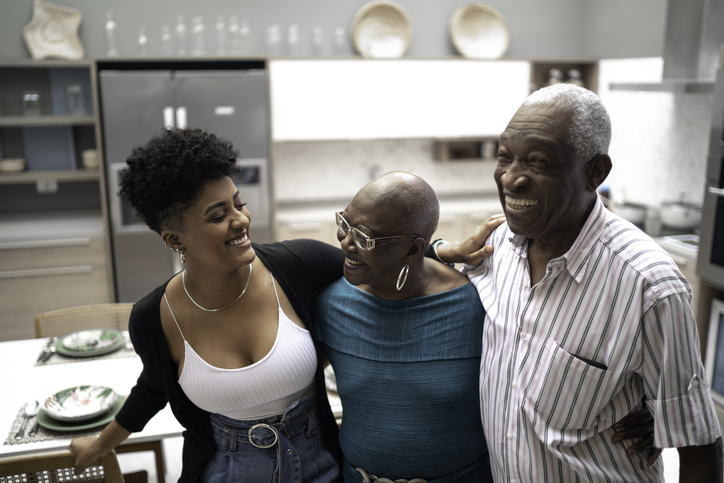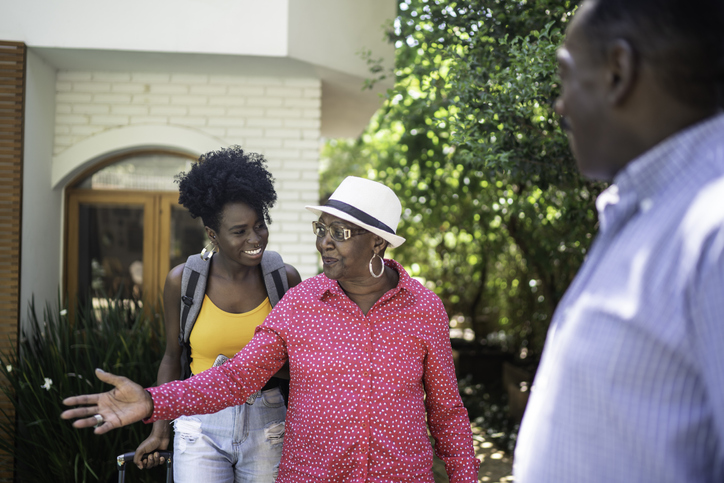Why You Can’t Feel Bad About Putting Your Parents In A Home - Page 11
Share the post
Share this link via
Or copy link

Source: RgStudio / Getty
Nobody is ready to accept the reality that their parents can no longer fully take care of themselves. Those are people you’ve always seen as so strong. Not only have they always taken care of themselves, but they’ve also always taken care of other people—including you. So it’s never, even in the slightest, easy to acknowledge it when your parents start to struggle with things like cooking for themselves, using the toilet, or simply getting up from bed. Nobody willingly watches their warrior use a walker. But, when that day comes, you’ll have a choice to make: do you have your elderly parent move in with you, or do you put her in a care facility with full-time help? Interestingly enough, it’s a cultural thing. Many other cultures find it shocking that Americans put their parents in retirement homes. But, every culture has its own set of values and ways they see things. Here are reasons it may be right for you to put your parent in a home, and why you can’t feel bad about it.

Source: kate_sept2004 / Getty
They want you to succeed
Caring for an elderly individual who can no longer handle simple tasks like making a pot of tea or bathing is a full-time job. That’s why there are careers in elderly care. But you likely already have a career, and it’s not in elderly care. There is a good chance that your parent wouldn’t want you to take time off work—or slack off in work—to care for them. You have put in so much time making career gains.

Source: FG Trade / Getty
In fact, your success is their success
Your parents worked hard to put you through school, and raise you to be bright and ambitious so you could have a great career. If they saw that caring for them meant you had to but your career on the back burner, that may actually break their heart.

Source: Geber86 / Getty
They want you to have a life
Love MadameNoire? Get more! Join the MadameNoire Newsletter
We care about your data. See our privacy policy.
When your parents were your age, they likely enjoyed an active social life. They had some good years back then. They can understand that becoming a 24/7 on-call nurse to them would mean that you’d no longer really get to enjoy your youth. And, they likely wouldn’t want that for you.

Source: kate_sept2004 / Getty
Elderly care is around-the-clock
Understand that, if your parent lives with you, and you leave the house, you could be called back at a moment’s notice when your parent simply cuts herself making a sandwich, can’t find her medication, falls, or many of the other things that can happen to the elderly daily. And while you want to spend time with your parent—of course—you also need to spend time with other people for your sanity. These are things people don’t realize about caring for an elderly parent. When your parent is in a home, you can enjoy going out, without fear that your parent is alone

Source: Courtney Hale / Getty
You’ll do your due diligence
It’s not like you’re just going to put your parent in the first home you find. You are going to do your research. You are going to visit many places, see how the residents are treated, see how uplifting the surroundings are, how educated the nurses are, and what sorts of activities, amenities, and food they offer the residents.

Source: FG Trade / Getty
You won’t pick a place until your parent is happy
The truth is that your parent may never be over the moon about going into a home, but, in her own way, she’ll show that she approves of a place. Maybe you see many places, and this is the first one where your parent hits it off with the nurses and wants to talk to the residents. You won’t select a home until you see your parent could actually smile there, on a regular basis.

Source: vitapix / Getty
You aren’t an RN
You aren’t a registered nurse (well, unless you are, in which case, thank you for your hard work). There will come a time when it would actually be irresponsible of you to try to care for our parent on your own, because it will require medical skills and knowledge that you don’t have. But there are homes with on-site registered nurses.

Source: kate_sept2004 / Getty
The staff will monitor changes
It’s the job of the staff to monitor any changes in your parent that you—and her doctor—should be aware of. You on your own may not recognize those changes if your parent lives with you because you’re not a medical professional and you’re just very busy.

Source: FG Trade / Getty
You’ll visit often
You can set regular times you’ll visit your parent, so she always knows she can look forward to those visits. You can visit so often that she gets sick of you, and wishes for some alone time.

Source: Shannon Fagan / Getty
Some homes offer more independence
Keep in mind that, not all retirement homes are created equally. There are some lovely ones with resort-style properties, and adorable cottages, where the residents don’t even feel like they’re in a care facility. Furthermore, they’ll feel more independent there than they would at your home, in your guest room.

Source: FG Trade / Getty
They can have friends
Remember how we talked about this change being positive for your social life? Well, it’s good for your parent’s, too. She wasn’t going to have much of a social life just living in your guest room, waiting for you to come home so she had someone to talk to. At a retirement home, there will be people around her all of the time.

Source: kali9 / Getty
It can make the most financial sense
This isn’t necessarily true for everybody, but similar to childcare, sometimes elderly care can be more affordable than what it could cost you to quit your job—or cut back on your hours—to care for your parent. If the home is $2,800 a month, and you make $6,500 a month at work, realize that you’d lose money by quitting your job to be your parent’s caretaker.

Source: davidf / Getty
And that money is for them
Also remember that one of the reasons you are choosing to work rather than stay home with your parent is so that you can provide her with a comfortable living situation. You want to keep cashing those big paychecks, so you can keep your mom in that nice home.

Source: AJ_Watt / Getty
You need to care for your children
If you have children, caring for kids and a live-in elderly parent is a lot of work—probably too much work. Your efforts on both fronts would suffer, and you’d feel like a bad parent and a bad caretaker to your parent.

Source: FG Trade / Getty
You can always bring her home
Nothing is permanent. If you aren’t happy with the facility, you can bring your parent home until you find a better one. And, when that difficult time comes at the very end of your parent’s life when you believe she’d like to pass in peace surrounded by loved ones, you can bring her home for in-home hospice.
-

Meet Dominique Fils-Aimé, The Haitian-Canadian Star Redefining Jazz For A New Generation: ‘This is My Vision' [Exclusive]
-

Cooking With Purpose — How Brittney Williams Honors Her Caribbean Roots Through Food
-

9 Famous Lesbian Women Who Were Married To Men
-

Purpose Behind The Lens: How Nate Edwards Films The Extraordinary Inside The Everyday








